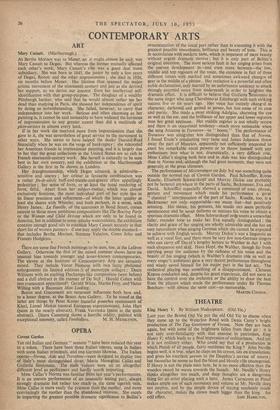OPERA
Covent Garden THE old Italian and German " seasons " have been reduced this year to a token. There have been three Italian operas, sung in Italian with some Italian principals, and one German likewise. The Italian operas—Norma, Aida and Trovatore—were designed to display two of Italy's most distinguished divas, Maria Meneghini Callas and Giulietta Simionato. The male visitors were on an altogether different level as performers and hardly worth importing.
Mme Callas's Norma was familiar from last year's performances. It is an uneven performance of an unusually testing part, always strongly dramatic but rather too much in the same tigerish vein. Mme Callas is more easily the priestess than the mother, and more convincingly the mother than the abandoned mistress. She excels in imparting the greatest possible dramatic significance to Bellini's ornamentation of the vocal part rather than in executing it with the greatest possible smoothness, brilliance and beauty of tone. This is in accordance with modem taste, which is impatient of mere beauty without urgent dramatic motive ; but it is only part of Bellini's original intention. The most serious fault in her singing arises from the uneven development in—and even more between—the low, middle and top registers of the voice, the existence in fact of three different voices with marked and sometimes awkward changes of gear in the middle of a phrase. Her recitative is a powerful and often noble declamation, only marred by an unfortunate tendency to attack strongly accented notes from underneath in order to heighten the dramatic effect. It is difficult to believe that Giulietta Simionato is the same singer who sang Cherubino at Edinburgh' with such striking success five or six years ago. Her voice has entirely changxl in character, darkened and gained in power, but lost some of its ease and purity. She made a most striking Adalgisa, charming the eye as well as the ear, and the brilliance of her upper and lower registers won her great applause. Her middle register is not wholly secure and there is an occasional tendency—much more noticeable when she sang Azucena in Trovatore—to " boom." The performance of Trovatore was altogether less distinguished than that of Norma. I found Erede's conducting very tame and James Johnston threw away the part of Manrico, apparently not sufficiently interested to , exert his remarkable vocal powers or to throw himself with any enthusiasm into what is not, dramatically, a Very difficult rOle. Mme Callas's singing both here and in Aida was less distinguished than in Norma and, although she had great moments, they were not generally at the great climaxes.
The performance of Meistersinger on July 3rd was something quite outside the normal run of Covent Garden. Paul Schoeffler, Bmno Kusche, Elizabeth Schwarzkopf and Murray Dickie can probably not be bettered anywhere in the parts of Sachs, Beckmesser, Eva and David. Schoeffler especially showed a command of tone, phrase, gesture and movement which made his performance a great " classical " interpretation of the part of Sachs. Kusche, too, is a Beckmesser not only supportable—no mean feat—but positively amusing. His stance, his gestures, his smalls tics seem perfectly spontaneous and he never deforms or misuses his voice to obtain a spurious dramatic effect. Mme Schwarzkopf only wants a somewhat fuller, rounder tone to make her Eva equally distinguished ; the clarity and grace of her singing are wholly admirable and she has an easy naturalness when singing German which she cannot be expected to achieve with English words. Murray Dickie's was a linguistic as well as a vocal feat, and there must be very few non-German singers who can carry off David's lengthy lecture to Walther in Act 1 with such eloquence and skill. Hans Hopf, the Walther, though far from carrying away the audience by the richness of his voice and the beauty of his singing (which is Walther's dramatic role as well as every singer's ambition) gave a very decent performance throughout and wisely saved himself for his major part in the last act. The orchestral playing was something of a disappointment. Clemens Krauss conducted and, despite his great experience, did not seem to have the control over the orchestra or the ability to draw the best from the players which made the performance under Sir Thomas Beecham—with almost the same cast—so memorable.
MARTIN COOPER.


































 Previous page
Previous page